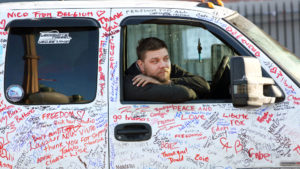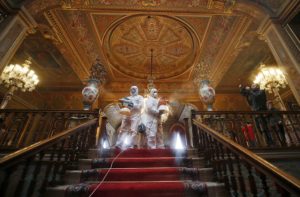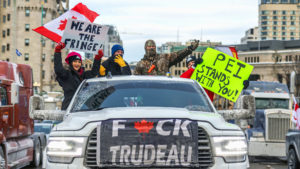When Justin Trudeau invoked emergency powers to quell protests against mandatory Covid-19 vaccinations this week, it was another sign that for Western liberal democracy, business as usual is over. This is the first time Canada’s Emergencies Act has ever been called upon by a Prime Minister. Its predecessor, the War Measures Act, was used three times: once for World War One, once for World War Two, and once to deal with a violent campaign of bombing, kidnapping, and murder by Quebecois separatists in 1970.
Yet Trudeau’s invocation of the Emergency Act is also a bizarre moment. Consider that the law stipulates that the government can fine people violating the act between 500 and 5,000 dollars. On the face of it, these are not numbers that seem commensurate to punish violators of the most powerful emergency law in the Canadian state’s armoury. But the reason these numbers seem so strange is simple: the law hasn’t been updated to keep up with the times, or inflation.
The oddness doesn’t end there. A law that in a real sense was forgotten — and designed to handle the most extreme situations a nation state can find itself in — is now dredged up to deal with a fairly routine political protest. Trudeau, and his finance minister Chrystia Freeland, have also called on financial institutions to freeze or suspend any bank accounts without a court order if they are being used to fund the protests. They believe, as David Frum writes in The Atlantic, that the truckers represent a “form of performative intimidation”.
Compared to the mass burning and vandalism of Catholic Churches in Canada last summer — which Trudeau both denounced and sympathised with, calling the arsons “understandable” at one point — the truckers hardly represent a nadir of public order. Across the border in the United States, the rioting that occurred there in the summer of 2020 involved loss of life, and massive damage to property. Back then Kamala Harris’s response was markedly similar to that of Trudeau — hand-wringing, sure, but also sympathy with the motivations of those who rioted.
Perhaps buildings being burned down, sometimes with their occupants still inside them, is just part and parcel of living in a vibrant democracy. Meanwhile, a protest that has led to zero loss of life and no torched buildings is cast as a grave threat to democracy. Put up bouncy castles for kids to play in and have public barbecues, as the truckers have done? Then, in the words of the New York Times’ editorial board, you are “far-Right”, and represent a “test of democracy” itself.
Or you will be accused of “sedition” by the usually phlegmatic Mark Carney. The former Bank of England governor may support Trudeau’s use of emergency powers, but by all indications it is a spectacularly ill-conceived move. Many provincial leaders are already openly rejecting the necessity of such extreme measures.
But the presence of open division among Canada’s political class — though fatal enough on its own — pales in comparison to the much deeper issue here. Throughout the protests, it’s been clear that the authorities — from Trudeau’s government down to the city of Ottawa itself — have lost control of the situation on the ground.
Tow truck companies openly refuse to tow trucks, and even the police force has proven itself to be unreliable. After an order came down to cut off the demonstrator’s supply of fuel for their trucks, the OPS did some perfunctory confiscations of jerry cans, but the only real result was that demonstrators started carrying around jerry cans en masse as a form of resistance. Not that they had to resist too hard; few police officers seemed interested in doing any policing in Ottawa — they were too busy being filmed hugging and greeting the protestors.
The same can be said of the Canadian Armed Forces, who do not seem bothered enough to play a role in resolving these demonstrations. In fact, the military is now investigating at least six of its members for actively supporting the trucker protest. Two of those under investigation belong to the elite Joint Task Force 2. Compared to the total manpower of the CAF, this might seem like a trifling matter, but as an indication of overall political reliability, it cannot be dismissed. The US military has seen similar indications of political unreliability with its own Covid mandates, so this is hardly some issue unique to Canada, either.
Where does all this leave the Trudeau government? Critics talk about creeping totalitarianism in Canada — though with the invocation of an outright legal state of exception it’s hard to say whether totalitarianism is actually “creeping” anymore. Others, mainly Americans, mutter darkly about “a certain F-word”. One can sympathise with the alarm informing these remarks, without fully buying into them. It only takes a couple of minutes thinking about the situation in Canada to realise how incredibly weird it is — and that weirdness requires some serious explanation.
When was the last time we saw totalitarianism associated with a government that has unreliable control of its police? That can’t control the roads of its own capital? A government calling for something akin to martial law but emphatically rejecting using the military — because they probably wouldn’t follow any orders to enforce it that they were given?
Tucker Carlson is calling Trudeau “the dictator of Canada“, but this seems like a very odd dictatorship indeed. One of the reasons given for calling this state of exception was that it allowed Trudeau to draft tow truck companies into performing paid but involuntary work.
This may well prove to be a crisis that undermines yet another plank of the post-Cold War liberal era, but V for Vendetta it is not. In that dystopian society, the state of exception is simply a normal way of life. Here, the police will not hesitate to shoot you the moment you cause trouble, and the fall of the totalitarian government comes after it is no longer able to keep the population in check through violence and intimidation. In Canada right now, however, the truth is much stranger than fiction. The state of exception has belatedly arrived only after clear signs from the police and the military that they are absolutely not going to be shooting anybody to begin with.
In regards to Trudeau’s actions being a form of “fascism”, that is perhaps an even harder case to make. It’s a point understandably overlooked today, but fascism, seen in its own day, was most definitely a forward-looking political force. The official hymn of the Italian fascist party under Mussolini, Giovinezza, literally means ”youth”. In the context of the early Twenties, fascists saw themselves — and were seen by many Western contemporaries, including Franklin Delano Roosevelt and David Lloyd George — as a rejuvenating, revolutionary force, whether for good or ill.
So let’s be honest with ourselves: it is impossible to look at this weak Canadian government — barely capable of enforcing its will on its own security forces — as a Mussolini-style fascist New Dawn. This sputtering display is about as far from a youthful springtime of the nation as it is possible to get. Trudeau seems mostly tired, under siege, and bereft of ideas, and politicians like him — who self-style as “defenders of democracy” — are now clearly becoming a sort of spent ideological force, barely able to muster a lick of respect from their unruly subjects.
But perhaps that is the new day that is dawning. Perhaps we are all headed in the same direction as Canada, where political polarisation between the rural population and the urban managerial classes, between the people who give orders and the people who are supposed to follow them, eventually produces a situation so untenable that the system simply snaps.
Not every part of the system, though. It is notable that Trudeau is calling on the banks and tech firms to help restore public order, while excluding any meaningful role for the military. The banks, as well as various parts of the tech sector, are increasingly looking like the only powerful institution that the managerial classes can expect to count on in a true crisis. Especially once the cops, truckers, firemen, pilots, rubbish collectors, special forces operators, sailors, and meter maids bid their politicians farewell and thanks for all the fish.
Unfortunately (or maybe not), those who derive an almost pornographic pleasure from fantasising about imminent totalitarian dystopia are likely to be sorely disappointed in the days and years ahead. Acts like the one just undertaken by the Canadian government amply illustrate that there’s no ten-thousand year Reich of Technocracy coming anytime soon.
The gulf in our societies between the people who work in the real world — those who keep the planes flying and the power on — and the restive and radicalised “email workers” of the urban class keeps growing more and more ominous and intractable. Trudeau can freeze as many bank accounts as he wants. If he thinks it’s a workable solution to this crisis, then the chaos is just getting started.
Disclaimer
Some of the posts we share are controversial and we do not necessarily agree with them in the whole extend. Sometimes we agree with the content or part of it but we do not agree with the narration or language. Nevertheless we find them somehow interesting, valuable and/or informative or we share them, because we strongly believe in freedom of speech, free press and journalism. We strongly encourage you to have a critical approach to all the content, do your own research and analysis to build your own opinion.
We would be glad to have your feedback.
Source: UnHerd Read the original article here: https://unherd.com




